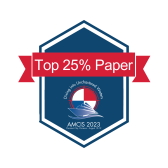Loading...
Paper Type
ERF
Description
Social referral reward programs (SRRPs) aim to incentivize existing customers to recommend a product or service to others. Based on the reward threshold, we classify social referrals into two categories: single-tasking social referral (SSR) and multi-tasking social referral (MSR). Considering that MSR involves multiple responders, we explore how to design an effective reward mechanism in this new context. Our primary interests in outcomes include users’ willingness to recommend and their continuous referral intentions. Drawing from fairness theory and loss aversion theory, we propose three reward models based on the keeping percentage of rewards obtained, i.e., keep-it-all (KIA), discounted keep-it-all (DKIA), and all-or-nothing (AON). We designed an experiment to test the hypotheses regarding the effects of reward types on referral intention and continuous intention. This study will provide important implications for research and practice in designing an effective reward mechanism in MSR.
Paper Number
1838
Recommended Citation
Li, Xu; Jiang, Qiqi; and Wang, Kanliang, "Referral Intention vs. Continuous Referral Intention: Incentive Mechanism in Multi-tasking Social Referral Programs" (2023). AMCIS 2023 Proceedings. 12.
https://aisel.aisnet.org/amcis2023/vcc/vcc/12
Referral Intention vs. Continuous Referral Intention: Incentive Mechanism in Multi-tasking Social Referral Programs
Social referral reward programs (SRRPs) aim to incentivize existing customers to recommend a product or service to others. Based on the reward threshold, we classify social referrals into two categories: single-tasking social referral (SSR) and multi-tasking social referral (MSR). Considering that MSR involves multiple responders, we explore how to design an effective reward mechanism in this new context. Our primary interests in outcomes include users’ willingness to recommend and their continuous referral intentions. Drawing from fairness theory and loss aversion theory, we propose three reward models based on the keeping percentage of rewards obtained, i.e., keep-it-all (KIA), discounted keep-it-all (DKIA), and all-or-nothing (AON). We designed an experiment to test the hypotheses regarding the effects of reward types on referral intention and continuous intention. This study will provide important implications for research and practice in designing an effective reward mechanism in MSR.
When commenting on articles, please be friendly, welcoming, respectful and abide by the AIS eLibrary Discussion Thread Code of Conduct posted here.




Comments
VCC